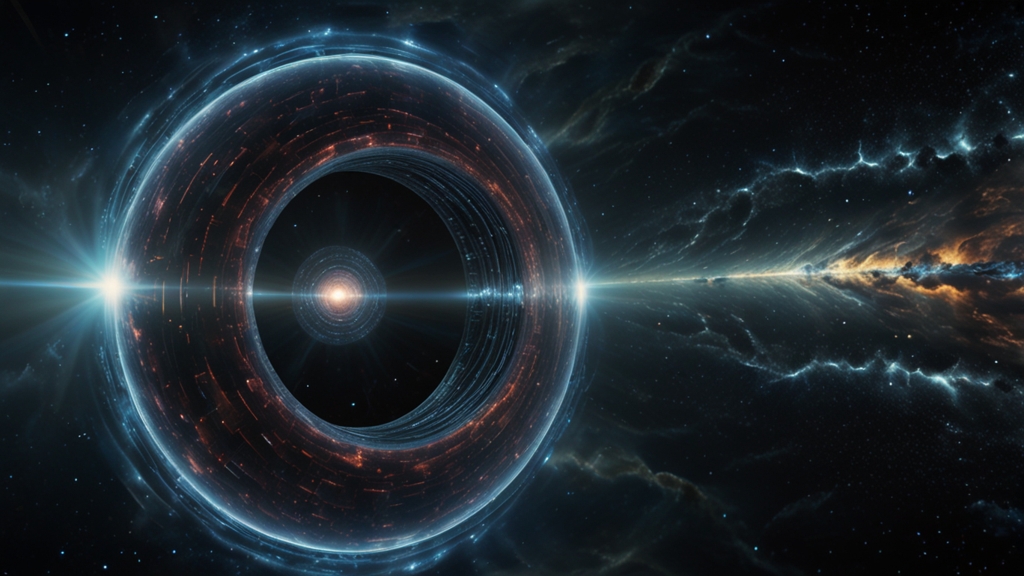Wormholes and Space-Time Travel: Are They Real?
The concept of wormholes and space-time travel has fascinated both scientists and science fiction enthusiasts for decades. But what are wormholes, and is space-time travel through them a real possibility or just a figment of our imagination?
Understanding Wormholes
A wormhole, also known as an Einstein-Rosen bridge, is a theoretical passage through space-time that could create shortcuts for long journeys across the universe. These wormholes are solutions to the Einstein field equations, which describe how matter and energy influence the curvature of space-time. In essence, a wormhole connects two distant points in space-time, potentially allowing for instantaneous travel between them.
The Science Behind Wormholes
The idea of wormholes originates from the work of Albert Einstein and Nathan Rosen in 1935. They proposed what is now known as the Einstein-Rosen bridge, which involves two black holes connected by a tunnel through which one could hypothetically pass. This concept is supported by the mathematics of general relativity, but there are significant challenges in making it practical or even proving its existence.
Richard Feynman, eminent theoretical physicist, once said, "There is plenty of room at the bottom." This phrase, although originally meant in a different context, aptly captures the essence of the quantum realm where the physics of wormholes theoretically resides.
Challenges in Realizing Wormholes
One of the biggest obstacles in using wormholes for space-time travel is their stability. According to current theories, most naturally occurring wormholes would collapse quickly, making them useless for transportation. To keep a wormhole open, one would need a form of "exotic matter" with negative energy density. While such matter has been theorized, it has yet to be discovered or created in sufficient quantities in a laboratory setting.
Even if stable wormholes could be created, there would still be enormous technical challenges to harnessing them for practical space travel. These challenges include handling the immense gravitational forces and ensuring that the passage through the wormhole does not result in catastrophic outcomes.
Space-Time Travel: Fact or Fiction?
The idea of using wormholes for space-time travel—moving not just through space but also through time—entices the imagination. Generally, the concept of time travel introduces paradoxes and complications that make it seem highly implausible. The famous "grandfather paradox," where a time traveler could potentially prevent their own existence by altering past events, exemplifies some of the potential inconsistencies.
Stephen Hawking, one of the most renowned physicists of the 20th century, famously noted, "If time travel is possible, where are the tourists from the future?" This underscores the apparent lack of empirical evidence to support the existence of time travelers among us.
Current Research and Future Prospects
Despite numerous obstacles, researchers continue to explore the theoretical underpinnings of wormholes and space-time travel. Advanced mathematical models and simulations using quantum mechanics and general relativity offer glimpses into what might be possible. Nevertheless, we are far from having the technology to create or manipulate wormholes for practical use.
Recent advances in quantum physics, particularly in the study of quantum entanglement, have prompted some scientists to speculate about the potential for wormhole-like phenomena. However, these ideas are still in the early stages of development and remain highly speculative.
As physicist Kip Thorne states, "Wormholes are an intriguing concept, but their practical implementation remains beyond our current technological and scientific capabilities."
Conclusion
Wormholes and the prospect of space-time travel continue to be compelling subjects for scientific inquiry and imagination. While the theoretical foundation for these phenomena exists, substantial empirical and technological hurdles must be overcome before they can become a reality. For now, wormholes and space-time travel remain largely in the realm of theoretical physics and science fiction. Nonetheless, ongoing research could one day reshape our understanding of the universe and our place within it.








